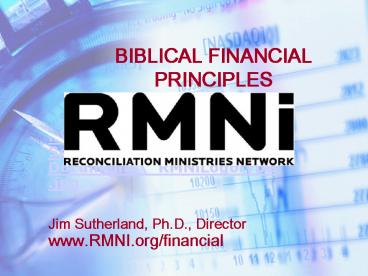BIBLICAL FINANCIAL PRINCIPLES - PowerPoint PPT Presentation
1 / 15
Title:
BIBLICAL FINANCIAL PRINCIPLES
Description:
You may have to adjust your budget each month, especially if your income varies ... TSAs, 401ks, Investment, Real Estate, CDs, Antiques presented at fair market value. ... – PowerPoint PPT presentation
Number of Views:1364
Avg rating:5.0/5.0
Title: BIBLICAL FINANCIAL PRINCIPLES
1
BIBLICAL FINANCIAL PRINCIPLES
..\Documents and Settings\Jim\My
Documents\_RMNiLogotype.jpg Jim Sutherland,
Ph.D., Director www.RMNI.org/financial
2
PLANNING WITH YOUR SURPLUS
- Gods plans never fail (Is. 1427 Ps. 3311), so
we need to try to understand Gods will (Eph.
517 Jer. 923-24). - Planning is spiritual (Prov. 125 163)?
- Get good counsel (Prov. 1215 1310)?
- God can will in our will (Phil. 212-13)?
- What has God given you faith to believe Him for
? Bill Gothard - Try constructing a financial timeline, using 70
years.
3
TWO APPROACHES TO SPENDING
- From a false assumption
- of what ought to be able to spend.
- I owe it to myself! I deserve to be able to
.a deductive approach - From actual income/provision
- From within the circle of Gods provisionan
inductive approach
4
Income usually isnt the major issue in budgeting
- Here is a list of the nations with the highest
percentage of consumers who have no spare cash
1America (22) 1Portugal (22) 3Canada (19)
4United Kingdom (17) 5France (16)
6Netherlands (15) ACNielson Online Consumer
Confidence SurveyGlobal Survey, 1/11/2005 - But godliness with contentment is great gain--1
Timothy 66
5
HOW TO BUDGET--7 STEPS
1. Pray for wisdom (James 15) and for
self-control (Galatians 523). Habitual
overspending is a spiritual issue. 2. BEFORE
spending, plan MONTHLY expenses and LONG TERM
GOALS (greater than 1 year, requiring
savings). 3. Record DAILY expenses in a columnar
ledger or software programkeep a running total
in each expense category (using the ledger or on
the outside of a cash envelope).
6
BUDGETING STEPS
4. At months end, TOTAL expenses in each
category and compare with target figures, and
adjust for next month, if needed. 5. Compare ALL
expenses and with ALL income. 6. Move any
surplus to savings, earmarking it for a
particular need. 7. Deduct any shortfall from
your next pay before spending it.
7
Go to www.crown.org/Tools/budgetguide.asp to
find percentages for each category for your
income.
Budget busters
Print this form at www.rmni.org/financial/income_a
nd_expense.pdf
8
Typical Budget Problems -1
- Spending over 40 of net spendable income (gross
income, less taxes and giving) for housing
utilities - Long distance/cell phone bills too highTip use
www.tel3advantage.com - Food category out-of-control, including eating
out Tip shop from menus - Over-recreating, including cable, trips and
fitness clubs movies Tip spend from envelope - Paying too much for auto insurance having
inadequate life insurance
9
Typical Budget Problems -2
- High debt load and failure to even list and total
all debt Tip debt list at www.rmni.org/financial
/debt_list.pdf --add interest rates - Little or no savingsfailure to plan for future
needs and goals - Miscellaneous spending out-of-control
- Unable to pay for private schooling
- Putting too much or too little into retirement
investments
10
Typical Budget Problems -3
- Little giving to Christian causes too much
giving to relatives - Inadequate or inordinate tax deductions
- High cost of health insuranceconsider a good
Christian health cooperative see - www.samaritanministries.org
11
Budget Balancing
- How do Americans try to balance their budgets?
- Cutting down on take-away meals66
- Saving on gas and electricity61
- Cutting back on out-of-home entertainment60
- Spend less on new clothes54
- Not driving as much47
- Switching to less expensive grocery brands42
ACNielson Online Consumer Confidence
SurveyGlobal Survey, 11/2005
12
6 LEVELS OF GIVING
1. Giving little or nothing. Among Baby-busters
(18-35), only half gave anything to the church in
2002.1 2. Inadequate giving. Giving less than
10. 3. Obedient giving. Giving a tithe. 4.
Giving beyond obedience--beyond the tithe. 5.
Giving generously, being willing to share (2
Cor. 96). 6. Surpassing generosity. Giving out
of Gods bounty, becoming a conduit of His
blessing (2 Cor. 98,10-11). In Larry Burketts
terms, we become a pipeline, instead of a pail.
1 George Barna, Americans Were More Generous in
2001 Than in 2000, 4/9/02, accessed at
www.barna.org on 2/7/03
13
BUDGETING TIPS
- At years end, total all expenses for each
category and divide by the number of months
included, to refine your monthly budget figures. - You may have to adjust your budget each month,
especially if your income varies (using a
computer spread-sheet helpshere is a template
www.rmni.org/financial/Budget20Spreadsheet.pdf
14
More BUDGETING TIPS
- Expect UNEXPECTED expenses. Satan will try to
discourage you. This is the reason for an
emergency fund. The budget may take at least 6
months to begin to work smoothly. - If you use software (Quicken,
- Money Matters, or MS Money), use both a
checking account (for checks debit cards) AND a
cash account, then combine them when running
reports. You may also need a credit card account
(you pay them off each month, right?), and again,
combine accounts for a report. Using software
makes tax season fairly simple.
15
- FINANCIAL STATEMENT
- As of_________________
- (Courtesy of Christian Financial Concepts, Inc.,
now Crown Financial Ministry)? - Visit the Financial Ministry section of
www.RMNI.org - ASSETS
- Liquid Assets1
LIABILITIES2 - ___________________ ____________
___________________ ___________ - ___________________ ____________
___________________ ___________ - ___________________ ____________
___________________ ___________ - ___________________ ____________
___________________ ___________ - ___________________ ____________
___________________ ___________ - ___________________ ____________
___________________ ___________ - Total liquid assets ____________
TOTAL LIABILITIES ___________
-
- Invested Assets3
- ___________________ ____________
- ___________________ ____________
- ___________________ ____________
- ___________________ ____________
NET WORTH __________
Do your assets exceed your liabilities? Use this
guide to determine the answer. For more Christian
stewardship information, see http//www.rmni.org/1
/powerpoint-presentations.html






























